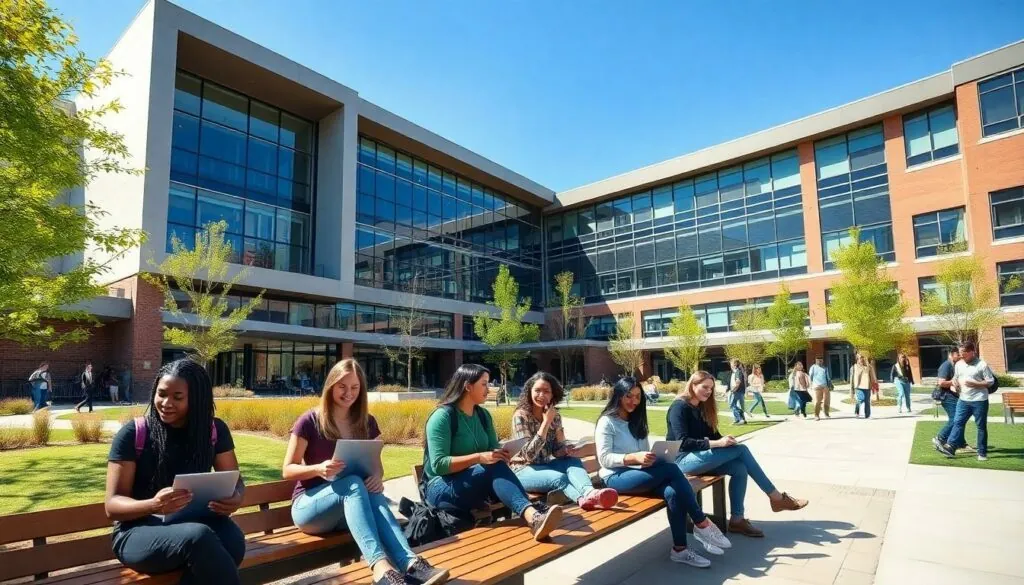Table of Contents
ToggleNestled in the heart of Denver, Morgridge College of Education stands out as a beacon for aspiring educators and leaders. With a mission to transform lives and communities, this college isn’t just about textbooks and lectures—it’s about crafting the future of education. Picture yourself in a place where innovation meets inspiration, and where every classroom is a launchpad for your dreams.
Overview of Morgridge College of Education
Morgridge College of Education stands as a leader in educational innovation based in Denver. Its dedication to enhancing education and community engagement shapes the experiences of students and faculty alike.
History and Background
Founded in 1997, Morgridge College has undergone significant growth and transformation. Initially part of the University of Denver, it became an independent college in 2008. The college has expanded its academic offerings, including programs in counseling, educational leadership, and curriculum studies. Enrolling over 600 students, it focuses on responding to the evolving demands of the education sector. The Morgridge College emphasizes real-world experience, integrating practical training with academic learning to prepare graduates for impactful careers.
Mission and Vision
Morgridge College of Education aims to transform lives through education and leadership. Its mission centers on developing innovative educators and leaders who can meet diverse societal needs. Fostering a commitment to equity, the college strives to create inclusive learning environments. The vision focuses on promoting lifelong learning and ensuring that every individual receives quality education. Through partnerships and community engagement, Morgridge College enhances educational opportunities and contributes to community well-being.
Programs Offered
Morgridge College of Education features a range of academic programs designed to develop skilled professionals in the education sector. Offering both graduate degrees and certificate programs, it caters to the diverse needs of aspiring educators and leaders.
Graduate Degrees
Graduate degrees at Morgridge include several focused areas of study. The Master of Arts in Counseling prepares students for careers in mental health and school counseling. The Doctorate in Educational Leadership targets individuals aiming for leadership roles in educational settings. Additionally, the Master of Arts in Curriculum Studies equips educators with the skills necessary for developing effective curricula. Coursework emphasizes practical application, enabling students to engage in real-world scenarios throughout their studies.
Certificate Programs
Certificate programs offer further specialization for professionals seeking to enhance their qualifications. These programs cover areas such as trauma-informed education and advanced instructor training. They provide targeted knowledge that complements existing degrees and experience. Participants gain practical skills that increase their effectiveness in various educational contexts. Furthermore, these short-term programs accommodate busy professionals, allowing for flexible learning options tailored to their needs.
Faculty and Staff
Morgridge College of Education prides itself on a dedicated faculty and staff committed to excellence in education. Their diverse expertise enhances the learning experience for students who aspire to be effective leaders in their fields.
Qualifications and Expertise
Professors at Morgridge College possess a wealth of qualifications and expertise. Many faculty members hold advanced degrees, including Doctorates in Education and Counseling. They actively contribute to research initiatives, bringing current findings into the classroom. Faculty members also maintain valuable connections within the education sector, providing students with insights from experienced practitioners. This combination of academic prowess and real-world experience ensures students receive relevant training to navigate modern educational challenges.
Student-to-Faculty Ratio
Morgridge College maintains a favorable student-to-faculty ratio of 12:1. This low ratio fosters personalized attention for each student, allowing for strong mentorship and support. Their approach helps cultivate a collaborative learning environment where questions flourish and ideas are exchanged freely. Students benefit from small class sizes that promote active participation and engagement. Faculty members often adapt their teaching methods to meet individual student needs effectively.
Campus Life
Morgridge College of Education offers a vibrant campus life that enriches the academic experience. Students benefit from numerous resources and opportunities to engage with peers.
Resources and Facilities
The college boasts state-of-the-art facilities designed to support learning. Libraries provide extensive educational resources, including books and digital archives. Classrooms feature advanced technology for interactive learning experiences. Outdoor spaces offer relaxation areas where students can unwind between classes. Additional amenities include study lounges and computer labs that facilitate research and group projects. These resources enhance both personal and academic growth.
Student Organizations
A variety of student organizations at Morgridge fosters community and collaboration. Options include educational clubs, honor societies, and advocacy groups that align with students’ interests. Participants can develop leadership skills while networking with fellow students and professionals. Organizations often host events, workshops, and social gatherings that promote engagement. Furthermore, involvement strengthens connections and enhances the overall college experience. Students find support and camaraderie through these groups, contributing to a dynamic campus culture.
Alumni Success Stories
Morgridge College of Education boasts a vibrant community of successful alumni who make significant impacts in their fields. Graduates consistently strive to innovate in education, counseling, and leadership.
Notable Graduates
Notable alumni from Morgridge College include education leaders and innovative counselors who inspire others. For example, Dr. Jane Smith, a 2005 graduate, serves as the superintendent of a large school district, focusing on equitable education for all students. Another distinguished graduate, Michael Johnson, has developed a nationally recognized counseling program addressing mental health in schools. Their achievements showcase the effectiveness of the college’s comprehensive training and commitment to real-world practice.
Career Opportunities
Career opportunities for Morgridge College graduates span various sectors, reflecting the college’s diverse academic offerings. Graduates often secure positions in public and private schools, non-profit organizations, and mental health facilities. Many pursue roles like educational administrators or curriculum developers, where they influence educational standards. Additionally, graduates are well-prepared for roles in counseling, serving diverse populations and addressing mental health needs. Their expertise supports community development and drives positive change in educational settings.
Conclusion
Morgridge College of Education stands as a beacon of innovation and excellence in the realm of education. Its commitment to developing skilled educators and leaders is evident through its diverse programs and dedicated faculty. The supportive campus environment fosters collaboration and personal growth, ensuring students are well-equipped to meet the challenges of modern education.
The college’s emphasis on community engagement and real-world application prepares graduates to make meaningful contributions in various fields. With a focus on equity and inclusivity, Morgridge College continues to transform lives and communities, shaping the future of education for the better.








